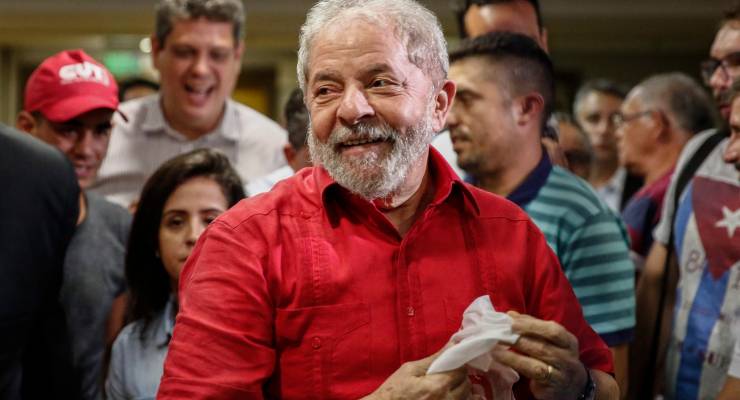
Brazil’s embattled president, Lula da Silva
Two decades ago, the left began to gain control in South America, with the election of Hugo Chavez in Venezuela, soon followed by Evo Morales in Bolivia, Rafael Correa in Ecuador, and, in 2003, “Lula” da Silva in Brazil, a former steelworker at the head of the Workers Party, winning victory on his fifth attempt.
Venezuela alone attempted to implement significant state socialism, fuelled by petrodollars; the debacle there has obscured the varieties of approaches to leftist reform across the continent, and their successes in alleviating poverty and extending democracy. Lula’s Brazil was the most centre-left of all these attempts, with its leader conscious that he was leading a global behemoth, not a small nation.
Consequently, the approach was to facilitate private development, and use the growth to fund new universal programmes. After a decade of Workers Party presidency, Brazil had come out of the UN World Hunger Programme, instituted universal social security payments, and expanded education and health networks in the vast favelas (slums, if you wish; non-official communities of the poor is better) round the cities, and thousands of peasant villages.
But though the Workers Party controlled the Presidency for four terms – Lula’s successor Films Rousseff, a former Communist urban guerrilla – they never controlled the Congress, which is split into a dozen major and median parties, and still more smaller ones. The Brazilian right, filled with the political descendants of the military dictatorship and death squads which operated until 1980 (the death squads well beyond that), never accepted Lula’s legitimacy, save as a political fact.
Dilma Rousseff was another matter, and by the time she began her second term in 2015, the Workers Party was tangled in two major, entwined scandals; the Petrobras, and ‘Car Wash’ both involving allegations of government favours for large construction corporations, and laundering of foreign cash and political donations. In 2016, they got Dilma impeached and removed, and right-wing leader Michel Temer instated as President. Temer has been seen as fantastically corrupt for ages; Dilma’s removal was never seen as anything other than political.
But Lula was always the target, and this week they have come closer to getting him, with a right-wing appeals judge upholding a July 2017 conviction for corruption, over allegations that Lula was gifted a free beach side house by construction firm OAS , the state oil company.
Lula’s defence is that its a total stitch up; he has no access to the house, title deeds etc, and the prosecution produced none. Corruption there certainly was – although, unlike Venezuela, it has never been crippling – but even if its true that Lula got a grace and favour bung, it hardly amounts to a kleptocracy.
There is every reason to believe in a frame up. Lula is eligible to be President again (candidates are limited to 2 consecutive terms, not 2 in total), and he is surging in the polls, compared to the now-discredited crew who replaced Dilma. His lead opponent, should he run, is likely to be Jose Bolsonario, a thuggish reactionary who has praised the death squads and dictatorship, and was wont to taunt Dilma about the torture and rape she suffered at the hands of the country’s military.
The appeals court upheld a lower court decision by Sergio Moro, a Harvard-trained lawyer, with strong ties to US ‘friendship’ organisations, and who has been accused of ‘lawfare’ from a classical liberal perspective against the Brazilian social democratic state. He has excelled himself here, turning a 9 year sentence into a 12 year sentence for Lula.
Lula can continue running until such time as the Supreme Court upholds his sentence; he almost certainly will, and they almost certainly will, after which another candidate can take over.
The strong sense that a popular and successful reformer has been railroaded, will only add to the South American left’s conviction – as an earlier coup, in Guatemala in 1954, convinced a generation of leftists that revolution was the only pathway – that significant power has to be seized, or the right will screw you anyway. No matter how moderate the reforms, no matter how steady and limited redistribution and betterment, the South American right’s aim appears to pitiless and total domination. What happens in Brazil will be a measure of political possibilities across the developing world.








Guy…your conclusive remarks are frightening, but I believe them to be correct.
We need to ‘stop the rot’ NOW in Oz!
Not just the developing world. The TrumpenMayBull monster yet lurches across the Anglosphere unmolested.
Consider that Blair, Krudd & Obama all came to office on tsunamis of popular joy following many years of dire conservative, with huge majorities, control of both Chambers and a long list of reforms.
Within months, if not weeks, they all were somehow inveigled to become compliant, complicit and conducive to good business relations.
Not as if we hadn’t seen majority governments dismissed in this country, Lang & Whitlam being just the most blatant.
Not sure we are any better off here on the cusp of Australia Day (and all the other alternative days). We’ve got a PM who is one of the world’s “one-percenters” and over the moon about the new TPP. Why wouldn’t you as one of the very, very few who will benefit. Across the developing world? I’ve been pondering recently with other cranky old people whether we will witness the next round of western revolutions in our lifetime. We are just sorry we will no longer be able to mount the barricades.
Let’s assume that your revolution succeeds in achieving ‘power’.
What then a realistic outcome of being in power? What, in the real world, will change?